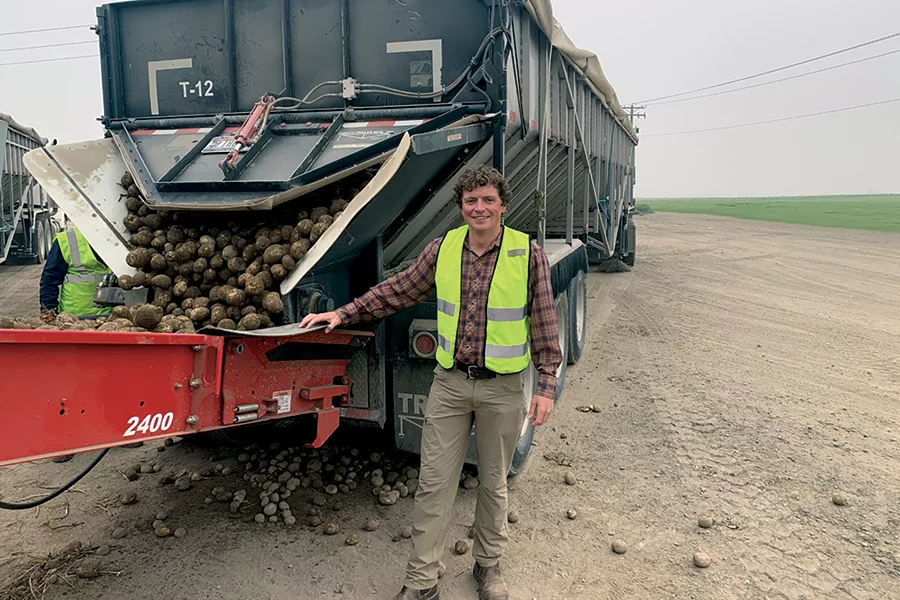
Home » Passion for spuds keeps grower in business
Passion for spuds keeps grower in business

June 13, 2022
By Pam Lewison
For some farmers, growing potatoes is about a passion for growing things and connecting with consumers.
Reagan Grabner, of CSS Farms, is one of those farmers. His family is one of the more than 300 families who make up Washington state’s potato growers.
“I was raised on a wheat farm and had the opportunity to work for a potato processor,” he said. “I really fell in love with the idea of growing a product that was more than a commodity, something that had high standards and a story that my customers cared about.”
CSS Farms produces potatoes for chips and french fries, and baby potatoes for fresh markets just outside Pasco. For Grabner, of all the varieties of potatoes the farm produces, his favorite way to incorporate potatoes into a meal is the simplest.
“It’s probably not the right answer, but I love roasted, simply prepared baby potatoes,” he said.
Helping Grabner grow his spuds are a team of 25 full-time employees with an addition of 25 seasonal employees, during the busy harvest season. For him, working alongside great people brings a lot of satisfaction.
“Accomplishing really hard goals as a team is the best part of farming,” he said.
Among those hard goals are those achieved by the plants themselves during the earliest parts of the growing season.
“It is the best job in the world because I get to see little miracles of life every day,” Grabner said. “When potato plants first crack through the soil, it is about the most amazing thing someone can witness.”
He called farming hard work with intangible rewards.
But it is not just the intangible rewards that make farming so important for Grabner. As a father of four boys and a wife he calls “a saint,” Grabner characterizes his job as important for other reasons, too.
“I get to be the steward of an amazing resource of land and help provide a livelihood to many awesome families,” he said.
The resources he cares for and the people he works with are hallmarks of Grabner’s discussions of his farm. He credits the river with the existence of the farm.
“This farm only exists because of the water in the Snake River,” Grabner said. “That is its source of water. Without it, we would raise dryland wheat every other year. If there was a change that prevented access to that water, the farm would cease to exist.”
The naysayers in the state and the people who try to direct farm policy without any direct knowledge of farming are one of Grabner’s business concerns.
“People who don’t have a full understanding of what we do telling us that we should be doing it differently is frustrating and one of the many challenges we face, amongst the weather, labor shortages and other risks,” he said.
Grabner extends an invitation to any legislator interested in seeing how involved he is in the growing and harvesting of the crops.
“We have started our growing season and will begin our potato harvest in late July. We would be glad to show any legislator interested around the farm and teach them about potato farming. I hope they don’t mind getting up early,” he said.
Learn more about Washington state’s potato legacy at potatoes.com.
Pam Lewison is the director of Washington Policy Center’s Initiative on Agriculture, which is based in the Tri-Cities.
Agriculture + Viticulture
KEYWORDS june 2022





